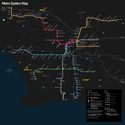The wreck of the 501–the Amtrak train that crashed near Seattle on Monday–is raising lots of questions about Amtrak operations, but they aren’t always the right ones. Here are some questions that should be asked and some of the Antiplanner’s preliminary answers. Answers from Amtrak (the operator), FRA (the funder), Sound Transit (the track owner), or WSDOT (the train owner) may differ. read more »
Transportation
In Defence of Sydney's Westconnex Motorway
The acrimonious battle over Australia’s largest motorway may be a case study in how class conflict plays out across the ‘post-industrial’ metropolis. On one side, inner-urban gurus of ‘liveability’ and ‘sustainability’ envisage a string of high-amenity havens for professionals in the weightless knowledge economy. On the other, a more dispersed population of workers in the material world of freight production, delivery and storage need efficient connections between a range of scattered industries and transportation hubs. read more »
- Login to post comments
Commuting in Canada: 2016 Census Report
Statistics Canada has just released the employment access data out of the 2016 Census, based on the main mode of commuting. Generally, there is little change between the modes, as Figure 1 indicates, compared to the 2011 Census results. (See: New Data on Commuting in Canada). read more »
- Login to post comments
Case Studies in Autonomous Vehicles, Part II: How Do We Accommodate Passengers with Non-Routine Needs?
In Part I of this series, I discussed one of the logistical challenges to broadening the adoption of shared use autonomous vehicles. Specifically, many trips involve multiple, intermediate stops that make it less convenient for people to utilize ride hailing services like Uber and Lyft. This state of affairs won’t change simply because vehicles become automated. read more »
Los Angeles Transit Ridership Losses Lead National Decline
In recent days, two well placed commentaries have detailed the recent declines both in US transit ridership, and in particular, Los Angeles, where the decline is most severe. read more »
- Login to post comments
Anaheim Transit: Suck It Up
When I was a kid back in 1971 I lived in Anaheim, California where my mom was a waitress at a local amusement park. Exploring Orange County as an adult recently it all felt more or less the same as I remembered – only more so. The primary adjective has always been beige. The last vestiges of orange groves that still lingered in my youth are long gone, but the tidy neighborhoods of modest tract homes, strip malls, and motels are all still there behind the shiny new stuff. read more »
What Does the Future Hold for the Automobile?
For a generation, the car has been reviled by city planners, greens and not too few commuters. In the past decade, some boldly predicted the onset of “peak car” and an auto-free future which would be dominated by new developments built around transit. read more »
- Login to post comments
Case Studies in Autonomous Vehicles, Part I: Shared Use Vehicles and the Challenge of Multiple, Intermediate Stops
There has been a lot of discussion about the potential of autonomous vehicles to change our transportation landscape, in particular the potential for such cars to be shared, reducing car ownership, parking needs and congestion on our roads. A principle idea behind this concept is that since autonomous vehicles can be driven from stop to stop without a driver, they will be cheaper and more mobile, prompting current car owners to switch to mobility as a service (MaaS) where rides are purchased on an as needed basis. read more »
- Login to post comments
Transit Work Access in 2016: Working at Home Gains
Working at home continues to grow as a preferred access mode to work, according to the recently released American Community Survey data for 2016. The latest data shows that 5.0 percent of the nation's work force worked from home, nearly equaling that of transit's 5.1 percent. In 2000, working at home comprised only 3.3 percent of the workforce, meaning over the past 16 years there has been an impressive 53 percent increase (note). Transit has also done well over that period, having increased approximately 10 percent from 4.6 percent. read more »
- Login to post comments
Commuting Data for 2016
Last week, the Census Bureau posted 2016 data from the American Community Survey, including population, income, housing, employment, and commuting data among many other categories. The survey is based on data from more than 3.5 million households. Today, the Antiplanner will look at commuting data: how people got to work in 2016 compared with previous years. read more »
- Login to post comments





















